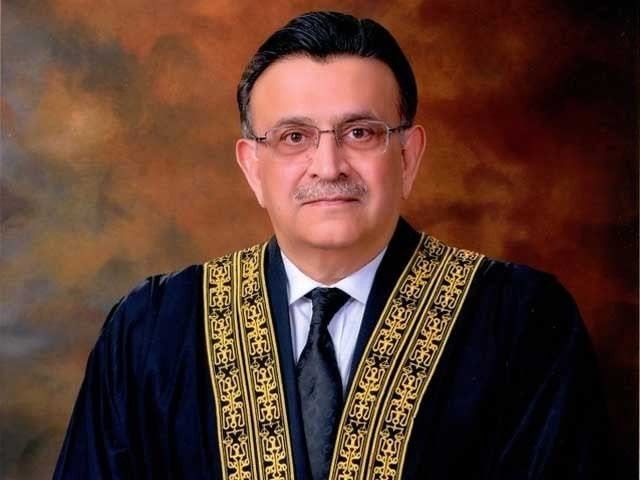NAB acted as 'instrument' of persecution: CJ
Justice Shah questions maintainability of Imran's challenge to NAB tweaks after walkout from parliament

Chief Justice of Pakistan (CJP) Umar Ata Bandial on Friday acknowledged that National Accountability Bureau (NAB) acted as an 'instrument' of persecution in many cases.
The observation came as the three-judge special bench of the apex court led by CJP Bandial and comprising Justice Ijaz ul Ahsan and Justice Syed Mansoor Ali Shah heard Pakistan Tehreek-e-Insaf (PTI) Chairman Imran Khan’s petition against recent amendments in National Accountability Ordinance (NAO) 1999.
Former premier Imran Khan had challenged the amendments to the accountability laws arguing that the tweaks would pave the way for public office holders to get away with white-collar crimes. The constitutional petition was filed under Article 184 (3) through renowned lawyer Khawaja Haris.
In its order on Friday, the bench asked both sides to assist the court on the need for accountability law which keeps a check on corruption fairly and at the same time ensures that accountability does not paralyse the civil service and scare investors away. It emphasised that a balance must be found between the two.
During the hearing, the CJP expressed concerns about how the NAB proceedings have affected the country's economy. He also referred to incidents wherein civil servants had refused to take decisions on account of their fear of the anti-graft watchdog.
He regretted that ultimately the matters were referred to the cabinet for approval which prolonged the decision-making, and adversely affected the country's economy such as the purchase of gas from foreign countries. He particularly referred to the Reko Diq case wherein Pakistan faced embarrassment.
However, the CJP said that there must be a threshold as due process and a fair trial could not be affected due to changes in the accountability laws.
He asked whether the evidentiary changes affect a fair trial, which protects the rights of the prosecution. He also noted that a case of assets beyond means was a classic offence wherein the prosecution may have no direct evidence to establish corruption.
The CJP cited the example of anti-terrorism courts (ATCs) whose jurisdiction was defined by the apex court in its judgements so that their work could move swiftly.‘Did Imran ask constituency before leaving parliament?’Meanwhile, Justice Syed Mansoor Ali Shah again raised questions concerning the maintainability of the petition, pointing out that what was the locus standi and credibility of the petitioner (Imran Khan) to file the petition after having walked out of the parliament wherein he could have resisted these amendments.
He further asked whether Imran Khan had asked the people of his constituency before leaving the parliament, and underlined that the parliament represented the will of the people and it has a central role in democracy.
The judge noted that designing the NAB’s law was not the apex court’s business and asked whether the bench could ask the parliament to make such a law. Moreover, he also inquired whether the tweaks have been also challenged in a high court.
Justice Shah further asked whether civil servants could be arrested on account of wrong decision-making. He said that if supposes that the parliament abolish capital punishment then the court could ask it to reverse the decision in this regard.
Justice Ijaz ul Ahsan wondered whether an amendment could be 'self-serving' in order to provide amnesty to public office holders. He expressed concerns over the retrospective effects of these amendments as well as the changing method to entertain evidence collected through mutual legal assistance (MLA).
Justice Ahsan also questioned the competence of the parliament to carry out legislation which is ‘self-serving'.
He expressed apprehensions that all decided matters would also be affected in view of these amendments.
Justice Ahsan posed questions about whether every government would amend NAB law in view of its desires.
'Accountability inherent in parliamentary system.'
Earlier, during the hearing, Imran Khan's attorney Khawaja Haris appeared before the bench and stated that the parliamentary system was a silent feature of the constitution, adding that the process of accountability was inherited by the parliamentary system which could not be altered by a constitutional amendment.
He recalled that in the Asfand Yar Wali case, the apex court had termed corruption a “cancer for society”. The lawyer stressed that accountability was essential for good governance, which is also a fundamental right as declared by SC in its judgment.
Haris contended that all pending cases would be ineffective on account of these amendments. He added that rule of law was also a fundamental right.
Taking the stand, counsel for the federal government Advocate Makhdoom Ali Khan also raised questions about the maintainability of the petition by referring to Imran Khan's petition which stated that he was challenging those amendments which were made through presidential ordinances during his own tenure.
He questioned how the president’s letter sent to the prime minister regarding these amendments was attached by the petitioner.
Makhdoom Ali Khan stated that he would show the bench through SC judgements how NAB was used for political consideration. He wondered whether there was no adequate law to eradicate corruption before NAO 1999.
The counsel also referred to the cases wherein NAB proceedings harassed international investors. He said that SC should not become the third chamber of parliament to consider every amendment in NAB law.
Subsequently, the court asked the lawyers to submit detailed written responses in the case and adjourned the hearing till August 19.



















COMMENTS
Comments are moderated and generally will be posted if they are on-topic and not abusive.
For more information, please see our Comments FAQ